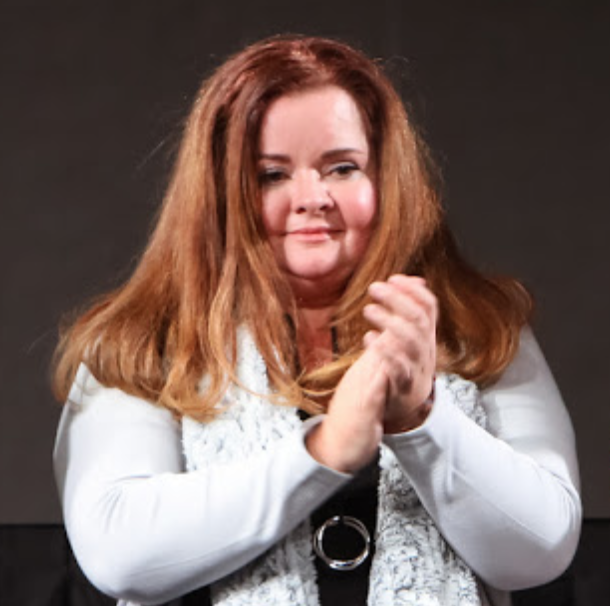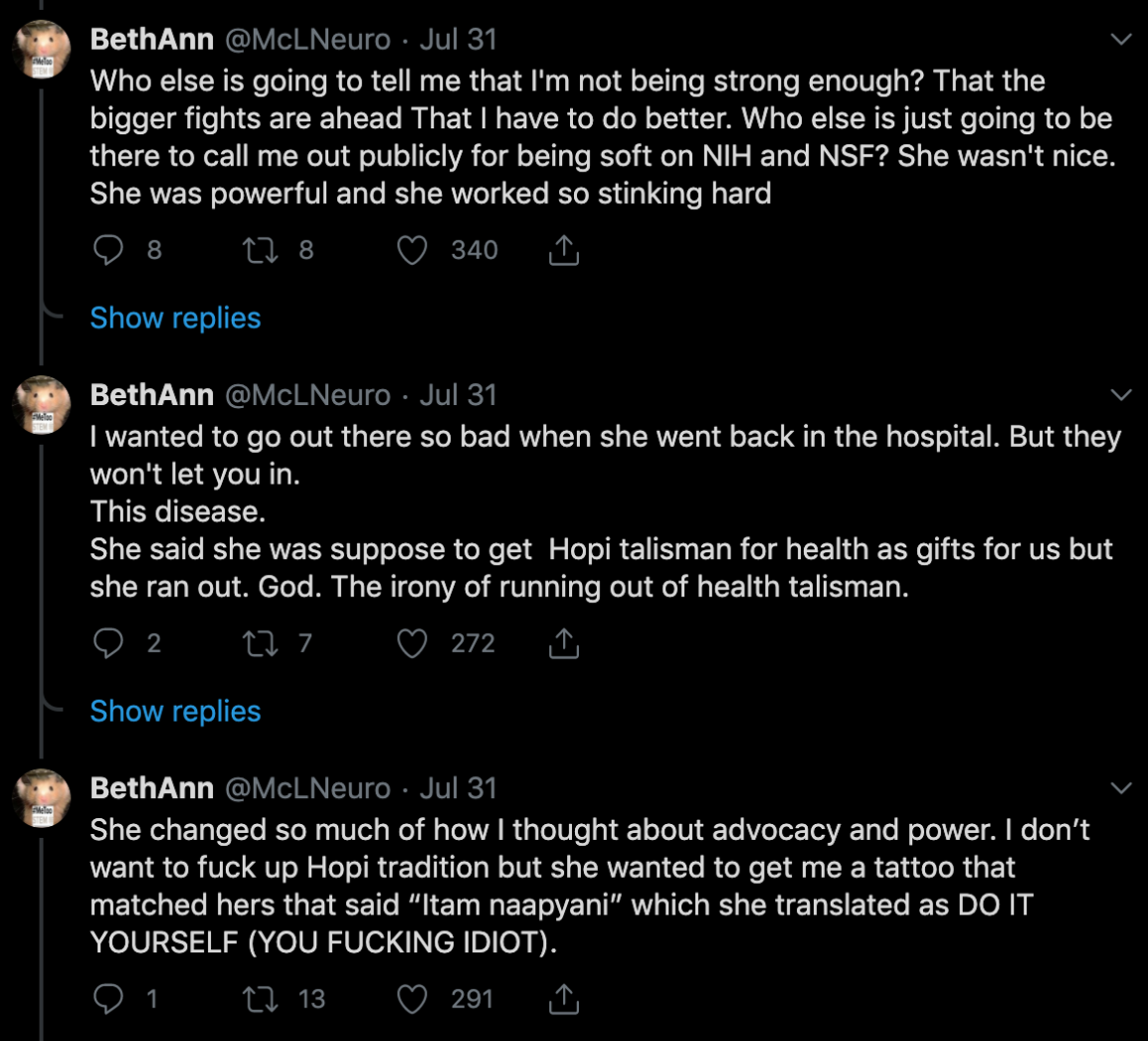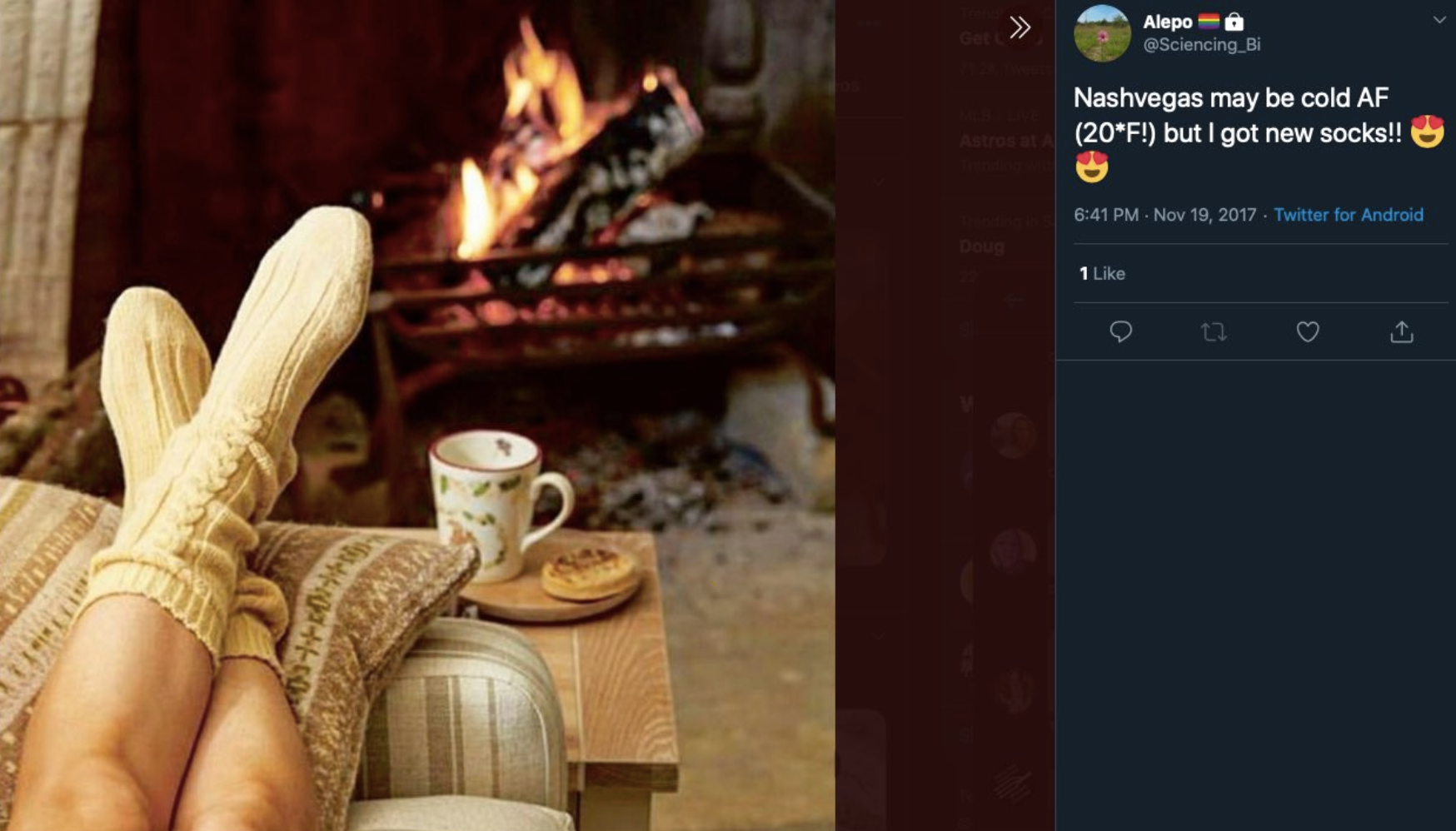You have /5 articles left.
Sign up for a free account or log in.

BethAnn McLaughlin
Wikimedia Commons
It might be the nail in the coffin for a polarizing figure in the MeTooSTEM movement. Beyond the person at the center of the apparent death hoax, the weirdness that recently overtook science Twitter says something about this already strange time in academe -- and the country, too.
Where to begin? Probably on Friday, when BethAnn McLaughlin, founder of the advocacy group MeTooSTEM, announced that a friend, @Sciencing_Bi on Twitter, died from COVID-19.
“She was a fierce protector of people,” McLaughlin wrote on her account, which has since been suspended. “No one has ever had my back like that.”
Sciencing_Bi, who always remained anonymous but identified as an anthropologist at Arizona State University and member of the Hopi Tribe, made a “million first nations Indigenous contacts for MeTooSTEM,” McLaughlin added.
 McLaughlin, a neuroscientist who says she lost her tenure bid at Vanderbilt University due to her activism against “harassholes,” has lots of Twitter followers. So did Sciencing_Bi, who sometimes defended McLaughlin against critics who said she was a toxic, controlling leader within MeTooSTEM.
McLaughlin, a neuroscientist who says she lost her tenure bid at Vanderbilt University due to her activism against “harassholes,” has lots of Twitter followers. So did Sciencing_Bi, who sometimes defended McLaughlin against critics who said she was a toxic, controlling leader within MeTooSTEM.
Sciencing_Bi revealed once that she’d been sexually assaulted by a prominent man in her field, after other complaints against him became public. And in April she announced that she’d been forced to teach in person at Arizona State during the pandemic and was suffering from a protracted coronavirus infection as a result. Many academics followed her dispatches from the sick bed, including this post, from May: “ASU kept teachers, staff and students on campus until April. That’s well after we knew this was a killer disease. Many got COVID. Including me.”
Sciencing_Bi’s health declined through last week, when McLaughlin announced her death.
“Please read her timeline,” McLaughlin wrote on Twitter. “Campus closed and she was in the hospital a week later. Be mad about COVID but be more mad that BIPOC community is most vulnerable and underrepresented on campus. We are killing them.” McLaughlin also wrote that she and Sciencing_Bi texted often and had planned to get matching Indigenous tattoos. She also suggested that the two may have had a romantic relationship, tweeting, "Looking at her side of the bed and crying. Just a lot of crying. I literally can do nothing."
The Unraveling
McLaughlin later held a small online memorial service for Sciencing_Bi, and that's when things begin to unravel. Some in attendance sensed holes in McLaughlin’s account of her friendship with Sciencing_Bi. Others, wanting to hold Arizona State accountable for the death of a faculty member due to teaching-related COVID-19, could find no death announcement or any other public clues about who she was. The institution is huge -- in retrospect, the perfect place to situate a fake ally -- but the total silence rang alarm bells.
Arizona State eventually put out a statement saying, “Unfortunately, this appears to be a hoax. We looked into this over the weekend and were unable to verify any connection with the university. We were in touch with several deans and faculty members and no one was able to identify the account or who might be behind it.”
Moreover, the university said, “Some of the past commentary this person posted was questionable, such as teaching in April. ASU transitioned to fully remote teaching in March. The person also mentioned salary reductions. We have not implemented any salary reductions here.” Arizona State has had “no one, such as a family member or friend, report a death to anyone at the university.”
McLaughlin did not respond to a request for comment. After accusations of fraud began to fly, she told The Arizona Republic, “To the extent that I have people engage with me on Twitter using accounts not associated with their names, I try to do that in good faith assuming they are authentic.”
The comment, captured in email screenshots, seems to suggest that McLaughlin never met Sciencing_Bi in person. But McLaughlin previously indicated on Twitter that she had met her in person. In one photo, for example, McLaughlin and her daughter seemed to be enjoying a paddling trip with Sciencing_Bi.
 There was more: Twitter sleuths traced Sciencing_Bi's posted photos, such as a cozy night at home by the fire, to stock photo websites. Others said their own online exchanges with Sciencing_Bi had been strange, as if they’d really been talking to McLaughlin. Once, Sciencing_Bi even asked her supporters to send her cash through McLaughlin's Venmo app account, so she wouldn't have to "break pseud." The occasion for the request? Sciencing_Bi said her dean asked her if she'd taken a DNA test to prove her ancestry.
There was more: Twitter sleuths traced Sciencing_Bi's posted photos, such as a cozy night at home by the fire, to stock photo websites. Others said their own online exchanges with Sciencing_Bi had been strange, as if they’d really been talking to McLaughlin. Once, Sciencing_Bi even asked her supporters to send her cash through McLaughlin's Venmo app account, so she wouldn't have to "break pseud." The occasion for the request? Sciencing_Bi said her dean asked her if she'd taken a DNA test to prove her ancestry.
"If people Venmo me $ for day drinking, I may email them and ask if they have taken a DNA test to prove they are an asshole,” she wrote.
Some critics also said that Sciencing_Bi, who was tweeting since at least 2016, only began to discuss her Hopi identity after McLaughlin was accused of silencing women of color within the MeTooSTEM organization, in 2019.
Possible precedent for faking identities exists, too. Whereas McLaughlin says she didn’t get tenure at Vanderbilt because she was outspoken against harassment, the university accused her of posting anonymous derogatory comments about colleagues. She denied that at the time.
Anger, Sadness and Told-You-Sos
Amid the findings, longtime supporters expressed sadness and anger about how they’d apparently been duped by someone whose job was to be trustworthy. Longtime detractors also expressed frustration that it took a dead fake person to bring down McLaughlin, when they’d been waving red flags all along about her.
Beyond allegedly silencing women of color and junior scientists who attempted to work with her, McLaughlin has previously been accused of bullying some sexual misconduct survivors on Twitter. She also once caused the cancellation of a panel on sexual harassment journalism at the City University of New York’s Graduate Center, after she threatened its organizers with legal action for using the #MeTooSTEM hashtag, according to the journalist Michael Balter. McLaughlin argued that it belonged to her organization, not the general antiharassment movement.
Twitter, for its part, swiftly suspended both McLaughlin’s account and Sciencing_Bi’s over the weekend.
‘Digital Redface’ and #MeTooSTEM's Future
Concerns among academics remain layered. McLaughlin’s critics accuse her of racism, in the form of inventing a person of color to prop her up, and then killing off that person when she was no longer useful or to make a political point, or both. They also accuse her of making light of professors’ very real fears about teaching in person during the ongoing coronavirus pandemic. And they of course worry that McLaughlin's apparent fraud will damage the Me Too movement in STEM, especially trust in anonymous complainants.
Chanda Prescod-Weinstein, assistant professor of physics and astronomy and a core faculty member in women’s studies at the University of New Hampshire, wrote of the controversy on Twitter, “Catfishing is not a nice thing to do and to catfish as queer indigenous person -- and then publicly kill that person off -- is unconscionable behavior.”
Prescod-Weinstein, who elsewhere has written about some of her experiences concerning both sexual misconduct and racism, said Monday, “Impersonating a Native American survivor of sexual assault is cruel in a time when people are so aware of missing and murdered women and when so many Native women have risked coming forward, using their real names.”
To have that person then die of COVID-19 when it's clear that Native American death rates from the virus are among the highest in the U.S. “is the most monstrous aspect for me,” she added.
Anna Fore Waymack, a Ph.D. candidate in medieval studies at Cornell University, also said McLaughlin’s apparent "digital redface" was most grotesque. She tweeted additional comments about McLaughlin having “blood on her hands,” as this “hoax of ‘forced to teach, died of COVID’ is hitting the news right as [university] admins make final decisions about reopening. About whether our fears are overblown.”
While the McLaughlin saga has rocked science Twitter in particular, Waymack said that “STEM, unfortunately, does not have a monopoly on hoaxes like this.” She cited the gripping blog posts from the self-labeled “Gay Girl in Damascus” revealed to be a white man from Georgia -- fellow medievalist Thomas J. MacMaster -- in 2011.
In any case, Waymack also said that she’s been following the McLaughlin issue “because STEM has been where the bulk of the antiharassment work has been happening, far beyond just McLaughlin. Look at Julie Libarkin, Deanna Arsala, Tisha Bohr, Erica Smith and so many others who have been putting in hours and brilliance.” All four of those academics were once involved with MeTooSTEM but left the organization. Bohr, Smith and Arsala are among those who accused McLaughlin of abuse and mismanagement. Some now organize under #STEMToo.
Regarding #MeTooSTEM’s future, Prescod-Weinstein said she didn’t know about its future as an organization. Yet “we rape and sexual harassment victims in STEM existed before the organization, and we will continue to exist after people are done talking about this week’s fiasco,” she said.
“The need to end rape culture everywhere, including in STEM, remains, and the struggle to end sexual violence and gendered discrimination will continue,” she added. “BethAnn didn’t start that movement, and no single person owns it.”
Michael Eisen, Howard Hughes Medical Institute Investigator and Professor of Genetics, Genomics and Development at the University of California, Berkeley, and a guest at the Zoom memorial for Sciencing_Bi, tweeted that the biggest victims of McLaughlin’ apparent “deception are real people going through real Title IX cases sci-bi insinuated herself into and has now undermined, and the real victims of BethAnn’s abuse at [MeTooSTEM] whose real concerns sci-bi helped to silence.”
He also warned against mistrusting pseudonymous accounts going forward, as such accounts “give a lot of marginalized people safety and a way to express themselves.”
Similarly, Eisen said via email that what happened doesn’t discredit the general MeTooSTEM movement or “anyone who takes it seriously.” Yet the apparent hoax “is ammunition for those who don't -- in specific cases and the grander discourse -- as it plays into those who argue that you can't trust anonymous accusations.”
The “whole thing is a betrayal of the movement,” he said.
And it’s a movement that McLaughlin did care about, even as she maimed it from within. One verified graduate student at Oklahoma State University, whom McLaughlin helped navigate through a sexual harassment case, and who wished to remain anonymous, said Monday, “Beth has all my respect and support.”





